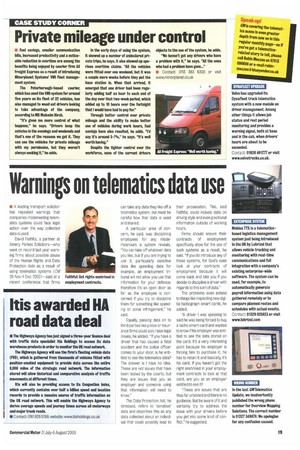Warnings on telematics data use
Page 19

If you've noticed an error in this article please click here to report it so we can fix it.
• A leading transport solicitor has repeated warnings that companies implementing telematics systems could face legal action over the way collected data is used.
David Faithful, a partner at Amery Parkes Solicitors—who went on record last year warning firms about possible abuse of the Human Rights and Data Protection Acts as a result of using telematics systems (CM 28 Nov-4 Dec 2002)—said at a recent conference that firms can take any data they like off a telematics system, but must be careful how that data is used and shared.
A particular area of concern, he said, was disciplining employees for any misdemeanours a system reveals. "You can take off whatever data you like, but if you are trying to use it, particularly sensitive data like speeding data for example, an employment tribunal will not allow you use that information for your defence; therefore it's an open door as far as the employee is concerned if you try to discipline them for something like speeding or zonal infringement," he said.
Equally, passing data on to third parties like police or insurance firms could also raise legal issues, he added. "If you have a driver that has caused a fatal accident and the police officer comes to your door, is he entitled to see the telematics data? The answer is I have no idea. These are not issues that have been tested by the courts, but they are issues that you as employer and someone using that information will need to know."
The Data Protection Act, he stressed, refers to 'sensitive' data and describes this as any data collected about an individual that could possibly lead to their prosecution. This, said Faithful, could include data on driving style and even positional information outside of working hours.
Firms should ensure their contracts of employment specifcally allow for the use of such systems as a result, he said. "If you do introduce any of these systems, for God's sake look at your contracts of employment because it will come back and bite you if you decide to discipline a driver with regards to this sort of data."
The problems even extend to things like inspecting new digital tachograph smart cards, he added.
"A driver I was speaking to said he was being forced to buy a tacho smart-card and wanted to know if his employer was entitled to see the data stored on the card. It's a very interesting point because his employer is forcing him to purchase it, he has to retain it and basically, it's his card. If you haven't got the right enshrined in your employment contracts to look at that card, are you as an employer entitled to see it?
"These are issues that are thus far untested and there is no guidance. But be aware of it and certainly try to address the issue with your drivers before you get into some kind of conflict," he suggested,
































































































































































